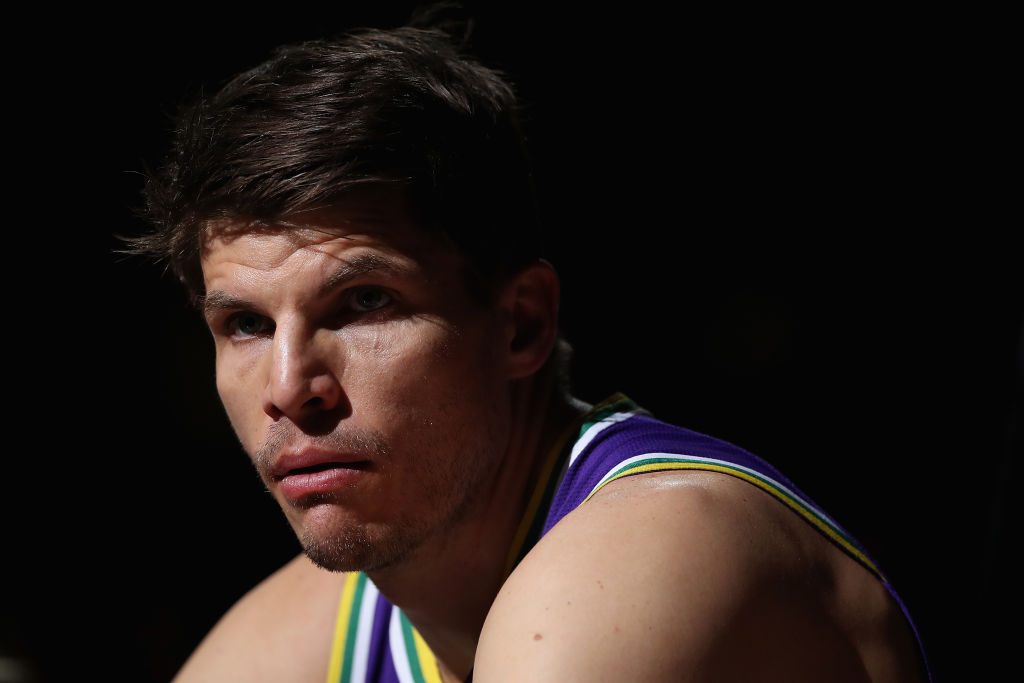
Kyle Korver just addressed the biggest elephant in the room.
The current Utah Jazz star is currently in his 16th season in the NBA, a career that has spanned five different NBA franchises and hundreds of different teammates.
It’s safe to say that Korver has experienced many different things from several different players and it has brought him to this moment.
The second round pick of the New Jersey(Brooklyn) Nets in 2003 recently wrote a piece for The Players’ Tribune where he talks about how he’s started to think more about the privilege he experiences as a white man, and how he needs to spend more time listening and holding other white men accountable in an effort to change how minorities, athletes or otherwise, are still treated in this country in 2019.
“There’s an elephant in the room that I’ve been thinking about a lot over these last few weeks. It’s the fact that, demographically, if we’re being honest: I have more in common with the fans in the crowd at your average NBA game than I have with the players on the court.
And after the events in Salt Lake City last month, and as we’ve been discussing them since, I’ve really started to recognize the role those demographics play in my privilege. It’s like — I may be Thabo’s friend, or Ekpe’s teammate, or Russ’s colleague; I may work with those guys. And I absolutely 100% stand with them.
But I look like the other guy.
And whether I like it or not? I’m beginning to understand how that means something.
What I’m realizing is, no matter how passionately I commit to being an ally, and no matter how unwavering my support is for NBA and WNBA players of color….. I’m still in this conversation from the privileged perspective of opting in to it. Which of course means that on the flip side, I could just as easily opt out of it. Every day, I’m given that choice — I’m granted that privilege — based on the color of my skin.
In other words, I can say every right thing in the world: I can voice my solidarity with Russ after what happened in Utah. I can evolve my position on what happened to Thabo in New York. I can be that weird dude in Get Out bragging about how he’d have voted for Obama a third term. I can condemn every racist heckler I’ve ever known.
But I can also fade into the crowd, and my face can blend in with the faces of those hecklers, any time I want.
I realize that now. And maybe in years past, just realizing something would’ve felt like progress. But it’s NOT years past — it’s today. And I know I have to do better. So I’m trying to push myself further.
I’m trying to ask myself what I should actually do.
How can I — as a white man, part of this systemic problem — become part of the solution when it comes to racism in my workplace? In my community? In this country?
These are the questions that I’ve been asking myself lately.
And I don’t think I have all the answers yet — but here are the ones that are starting to ring the most true:
I have to continue to educate myself on the history of racism in America.
I have to listen. I’ll say it again, because it’s that important. I have to listen.
I have to support leaders who see racial justice as fundamental — as something that’s at the heart of nearly every major issue in our country today. And I have to support policies that do the same.
I have to do my best to recognize when to get out of the way — in order to amplify the voices of marginalized groups that so often get lost.
But maybe more than anything?
I know that, as a white man, I have to hold my fellow white men accountable.
We all have to hold each other accountable.
And we all have to be accountable — period. Not just for our own actions, but also for the ways that our inaction can create a “safe” space for toxic behavior.”
Read the entire piece here:


